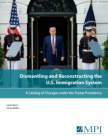Border Security
Recent Activity

Testimony of Doris Meissner, Senior Fellow and Director, U.S. Immigration Policy Program, before the Committee on Homeland Security and Governmental Affairs, U.S. Senate.

A panel discussion on the release of the Regional Migration Study Group's final report, Thinking Regionally to Compete Globally: Leveraging Migration & Human Capital in the U.S., Mexico, and Central America, outlining its findings and offering recommendations to policymakers in the region.

This MPI event discussed the Dutch model for fighting human trafficking and the strategic and operational dilemmas that public prosecutors in the Netherlands face.


MPI has released a major study that describes and analyzes today’s immigration enforcement programs, as they have developed and grown in the 25 years since IRCA launched the current enforcement era.
Pages
Recent Activity
Los llamados de los activistas a "desbancar a la policía", a raíz de una serie de encuentros mortales para los miembros de la comunidad negra, hacen eco de las demandas anteriores de "abolir el ICE" y reflejar una crítica más amplia de los sistemas de aplicación percibidos como demasiado agresivo.
El acuerdo de cooperación migratoria firmado por los gobiernos de México y Estados Unidos en junio de 2019 marcó el comienzo de un intenso período de cambio en las políticas mexicanas, con efectos en su frontera compartida. Un año después, el informe examina cambios en los sistemas de control migratorio y protección humanitaria de México. También explora cómo la pandemia del COVID-19 ha afectado la frontera y destaca oportunidades para el desarrollo de políticas en el futuro.















The Rocky Road to a Mobile World after COVID-19